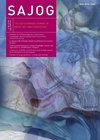Maternal intravenous immunoglobulin: A non-invasive treatment option for Rhesus D-sensitised women with previous adverse pregnancy outcomes
IF 0.4
Q4 OBSTETRICS & GYNECOLOGY
引用次数: 0
Abstract
Background. Maternal intravenous immunoglobulin (IVIG) may delay the onset and severity of fetal anaemia in Rhesus D (RhD)- sensitised pregnancies, thereby minimising the need for intrauterine transfusion and its associated complications. Objective. To compare the pregnancy outcomes of RhD-sensitised women who received antenatal IVIG with those who did not receive antenatal IVIG. Methods. This was a retrospective cross-sectional analysis of RhD-sensitised women who attended the Wits Fetal Medicine Centre (Johannesburg) from 1 January 2008 to 31 May 2018. Criteria for maternal IVIG administration were: (i) previous adverse pregnancy outcome (early neonatal death, intrauterine fetal death or miscarriage related to RhD sensitisation), ( ii ) women with high antibody titre levels (≥1:64) in the absence of fetal anaemia; and ( iii ) rising antibody titre levels. Maternal antibody titre levels, pregnancy and neonatal outcomes were compared in women who received IVIG v. those who did not receive IVIG. Results. Of the 42 RhD-sensitised women, 14 received IVIG. A greater proportion of women experienced a decrease in antibody titres in the IVIG v. no-IVIG group (43% v. 11%, respectively; p =0.04). Nine of the 10 women in the IVIG group with a previous adverse pregnancy outcome had a successful pregnancy outcome following IVIG treatment. Conclusion. Maternal IVIG may provide a successful pregnancy outcome in RhD-sensitised women with previous adverse pregnancy outcomes related to Rh disease, or women with raised or increasing maternal antibody titre levels who present in the first or early second trimester.母体静脉注射免疫球蛋白:既往有不良妊娠结局的恒河猴D敏感妇女的一种非侵入性治疗选择
背景母体静脉注射免疫球蛋白(IVIG)可以延缓RhD(RhD)致敏妊娠胎儿贫血的发作和严重程度,从而最大限度地减少宫内输血及其相关并发症的需要。客观的比较产前接受IVIG的RhD敏感妇女与未接受IVIG治疗的妇女的妊娠结局。方法。这是对2008年1月1日至2018年5月31日在威茨胎儿医学中心(约翰内斯堡)就诊的RhD敏感女性的回顾性横断面分析。母体IVIG给药的标准为:(i)既往不良妊娠结局(新生儿早期死亡、胎儿宫内死亡或与RhD致敏有关的流产),(ii)在没有胎儿贫血的情况下抗体滴度水平高(≥1:64)的妇女;和(iii)抗体滴度水平上升。比较接受IVIG和未接受IVIG的妇女的母体抗体滴度水平、妊娠和新生儿结局。后果在42名对RhD敏感的妇女中,有14名接受了IVIG。IVIG组与非IVIG组中,抗体滴度下降的女性比例更大(分别为43%和11%;p=0.04)。IVIG组10名既往妊娠不良的女性中,有9名在IVIG治疗后妊娠成功。结论母体IVIG可为既往有与Rh疾病相关的不良妊娠结局的RhD敏感妇女,或妊娠早期或中期出现的母体抗体滴度升高或增加的妇女提供成功的妊娠结局。
本文章由计算机程序翻译,如有差异,请以英文原文为准。
求助全文
约1分钟内获得全文
求助全文
来源期刊

South African Journal of Obstetrics and Gynaecology
Medicine-Obstetrics and Gynecology
CiteScore
0.40
自引率
0.00%
发文量
5
审稿时长
15 weeks
期刊介绍:
The SAJOG is a tri-annual, general specialist obstetrics and gynaecology journal that publishes original, peer-reviewed work in all areas of obstetrics and gynaecology, including contraception, urogynaecology, fertility, oncology and clinical practice. The journal carries original research articles, editorials, clinical practice, personal opinion, South Africa health-related news, obituaries and general correspondence.
文献相关原料
| 公司名称 | 产品信息 | 采购帮参考价格 |
|---|
 求助内容:
求助内容: 应助结果提醒方式:
应助结果提醒方式:


